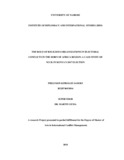| dc.description.abstract | The Horn of Africa’s political landscape has been marred by protracted conflicts,
which are worsened by lack of effective ways to manage them. With the management
bodies in place, which are seen to be weak due to political influence, Kenya may lose
its strategic importance if electoral conflicts continue to occur in every electoral
process. Regrettably, and despite the fact that Religious Organizations (ROs) can play
a critical role in checking post-election conflicts, no documented study has assessed
the roles and challenges facing such organizations in the highly contested presidential
elections of 2017 which resulted in the loss of human lives and property in some areas
in Kenya. This study therefore identified the role played by NCCK during the 2017
electoral violence and made recommendations on how best the government can
incorporate these institutions in future conflict management and resolution. The study
is guided by specific objectives which include to; investigate the role played by
NCCK in the 2017 Kenyan post-election conflicts; explore the key strategies applied
by NCCK in Kenya’s 2017 electoral conflicts and; examine the key challenges faced
by NCCK in resolving the 2017 Kenyan post-elections conflict. This study adopted
two theoretical foundations: the Conflict Theory and the Dual Concern Model of
Conflict Resolution. Based on the exploratory research design, data was collected
from 110 persons (21 permanent staff of NCCK, 37 employees of the IEBC
headquarters in Nairobi, 2 OCPDs and, 50 community leaders. The community
leaders were drawn from Kawangware and Kibera areas of Nairobi, the two areas
were hard hit by the 20017 post-election violence in Kenya. Data was collected from
primary and secondary sources using interviews, questionnaires as well as deskreview
of existing literature. Such data was analyzed using descriptive statistics as
well as conceptual content analysis techniques. The findings obtained show that
NCCK in the 2017 played a vital role in the Kenyan post-election conflicts. This is
due to the fact that religious leaders had some form of trust and moral authority,
though not much, that could be used to check conflict in electoral disputes.
Regrettably, there is no clear evidence that ROs used proper strategies to mitigate the
2017 post-poll conflict. However, ROs under the auspices of NCCK were pivotal to
the democratization process and peace-building initiatives in Kenya. Lastly, it is
evident that most cases ROs face numerous challenges such as lack of moral authority
to talk against postelection violence in some instances due to bipartisanship, lack of
adequate financial resources to successfully undertake conflict resolution strategies as
well as internal bureaucratic tendencies that bred inter-religious tension were also
major factors inhibiting effective conflict resolution by ROs. As such, ROs such as
NCCK should put in place strategies for strengthening their trust and moral authority
and technical as well as financial capacity so as to be effective in checking postelection
disputes and the associated violence.” | en_US |



